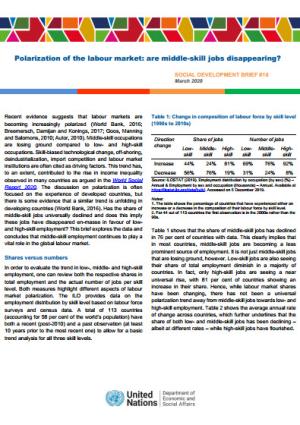Recent evidence suggests that labour markets are becoming increasingly polarized (World Bank, 2016; Breemersch, Damijan and Konings, 2017; Goos, Manning and Salomons, 2010; Autor, 2010). Middle-skill occupations are losing ground compared to low- and high-skill occupations. Skill-biased technological change, off-shoring, deindustrialization, import competition and labour market institutions are often cited as driving factors. This trend has, to an extent, contributed to the rise in income inequality observed in many countries as argued in the World Social Report 2020.
The discussion on polarization is often focused on the experience of developed countries, but there is some evidence that a similar trend is unfolding in developing countries (World Bank, 2016). Has the share of middle-skill jobs universally declined and does this imply these jobs have disappeared en-masse in favour of low- and high-skill employment? This brief explores the data and concludes that middle-skill employment continues to play a vital role in the global labour market.
 Welcome to the United Nations
Welcome to the United Nations
